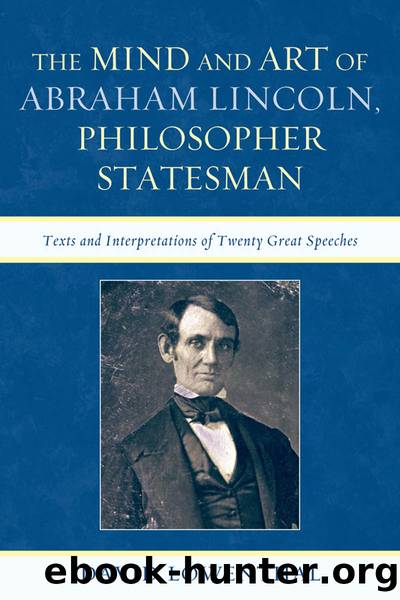The Mind and Art of Abraham Lincoln, Philosopher Statesman by Lowenthal David;Lowenthal David;

Author:Lowenthal, David;Lowenthal, David;
Language: eng
Format: epub
ISBN: 1466970
Publisher: Lexington Books
Interpretation
With something like the blast of a trumpet, the new Republican candidate for the U.S. Senate announces that the constitutional compromise over slavery developed by the founding fathers cannot continue: the country has to go fully toward freedom or fully toward slavery. âA house divided against itself cannot stand.â The quotation is from the Gospel According to St. Matthew, 12:25, where Jesus denies that he casts out demons âonly by Beelzebub, the prince of demons,â since that would show Beelzebub to be divided against himself. It is rather by the Spirit of God that he casts demons out.
Casting out the demon of slavery is another story. As Lincoln sees it, the nation is in crisis, brought about by a combination of Judge Douglasâ Kansas-Nebraska Act of 1854 and the Supreme Courtâs Dred Scott decision of 1857. The former, far from ending the agitation over slavery, as promised, has resulted in its being âconstantly augmented.â Beyond these, action by the president himself has added to Lincolnâs conviction that all were parts of a complex conspiracy. How else could the apparently unrelated actions dovetail so well? In the Dred Scott decision, Chief Justice Taney had made three rulings: 1) no ânegro slaveâ can ever âbe a citizen of any Stateâ; 2) âneither Congress nor a Territorial Legislature can exclude slavery from any United States Territoryâ; 3) the decision as to whether a black slave is made free by being taken by his master into a free state will be left to the state courts in slave states. This last opens up the possibility that large quantities of slaves can be brought into free states by their slave masters, without legal hindrance. Note that the first two provisions directly violate Douglasâ notion of âpopular sovereignty,â since they strip from the people the right to exclude slavery from the territories and allow blacks to become citizens. To complete this plot, all that is needed is âanother Supreme Court decision, declaring that the Constitution of the United States does not permit a state to exclude slavery from its limits.â
With this wave of changes strengthening slavery and the slave states in a possibly decisive way, Lincoln sees that moving back to the Constitutionâs original compromise is no longer possible. Hence his conclusion: âI believe this government cannot endure, permanently half slave and half free. I do not expect the Union to be dissolvedâI do not expect the house to fallâbut I do expect it will cease to be divided. It will become all one thing, or all the other.â Bear in mind that the forces for freedom had received powerful setbacks from both Congress and the Supreme Court, assisted as well by the president, and were now drastically on the defensive. Lincoln had to rally the defenders of freedom: he had to make sure they understood the stark reality of their situation. And he had to call for concerted action.
To âmeet and overthrow the powerâ of the âpresent political dynastyâ is the object the Republicans must set themselves.
Download
This site does not store any files on its server. We only index and link to content provided by other sites. Please contact the content providers to delete copyright contents if any and email us, we'll remove relevant links or contents immediately.
| Diaries & Journals | Essays |
| Letters | Speeches |
The Rules Do Not Apply by Ariel Levy(4608)
Bluets by Maggie Nelson(4323)
Too Much and Not the Mood by Durga Chew-Bose(4136)
Pre-Suasion: A Revolutionary Way to Influence and Persuade by Robert Cialdini(4017)
The Motorcycle Diaries by Ernesto Che Guevara(3835)
Walking by Henry David Thoreau(3742)
Schaum's Quick Guide to Writing Great Short Stories by Margaret Lucke(3220)
What If This Were Enough? by Heather Havrilesky(3218)
The Daily Stoic by Holiday Ryan & Hanselman Stephen(3145)
The Day I Stopped Drinking Milk by Sudha Murty(3120)
The Social Psychology of Inequality by Unknown(2808)
Why I Write by George Orwell(2800)
Letters From a Stoic by Seneca(2685)
A Short History of Nearly Everything by Bryson Bill(2531)
Insomniac City by Bill Hayes(2421)
Feel Free by Zadie Smith(2393)
A Burst of Light by Audre Lorde(2369)
Upstream by Mary Oliver(2289)
Behave: The Biology of Humans at Our Best and Worst by Robert M. Sapolsky(2198)
